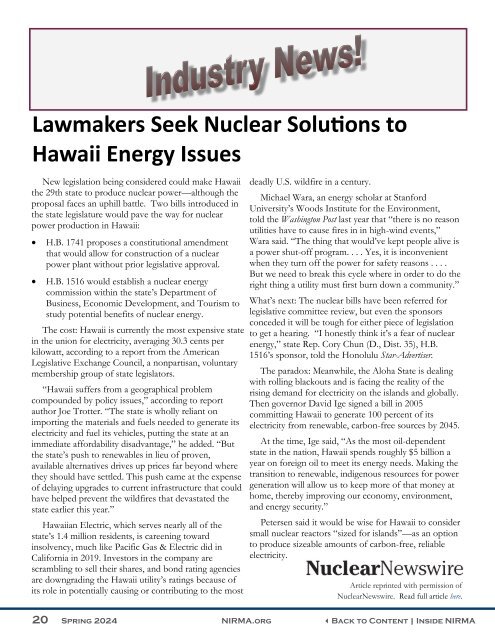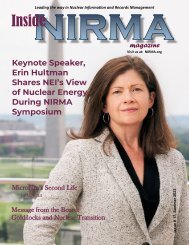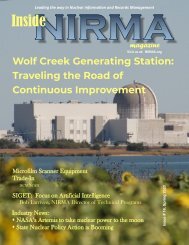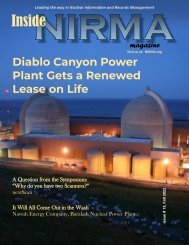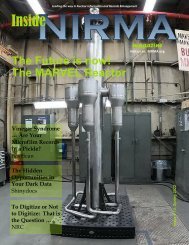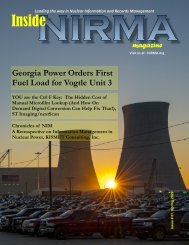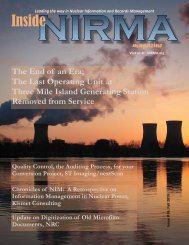Spring 2024 Inside NIRMA Magazine
Create successful ePaper yourself
Turn your PDF publications into a flip-book with our unique Google optimized e-Paper software.
Lawmakers Seek Nuclear Solutions to<br />
Hawaii Energy Issues<br />
New legislation being considered could make Hawaii<br />
the 29th state to produce nuclear power—although the<br />
proposal faces an uphill battle. Two bills introduced in<br />
the state legislature would pave the way for nuclear<br />
power production in Hawaii:<br />
• H.B. 1741 proposes a constitutional amendment<br />
that would allow for construction of a nuclear<br />
power plant without prior legislative approval.<br />
• H.B. 1516 would establish a nuclear energy<br />
commission within the state’s Department of<br />
Business, Economic Development, and Tourism to<br />
study potential benefits of nuclear energy.<br />
The cost: Hawaii is currently the most expensive state<br />
in the union for electricity, averaging 30.3 cents per<br />
kilowatt, according to a report from the American<br />
Legislative Exchange Council, a nonpartisan, voluntary<br />
membership group of state legislators.<br />
“Hawaii suffers from a geographical problem<br />
compounded by policy issues,” according to report<br />
author Joe Trotter. “The state is wholly reliant on<br />
importing the materials and fuels needed to generate its<br />
electricity and fuel its vehicles, putting the state at an<br />
immediate affordability disadvantage,” he added. “But<br />
the state’s push to renewables in lieu of proven,<br />
available alternatives drives up prices far beyond where<br />
they should have settled. This push came at the expense<br />
of delaying upgrades to current infrastructure that could<br />
have helped prevent the wildfires that devastated the<br />
state earlier this year.”<br />
Hawaiian Electric, which serves nearly all of the<br />
state’s 1.4 million residents, is careening toward<br />
insolvency, much like Pacific Gas & Electric did in<br />
California in 2019. Investors in the company are<br />
scrambling to sell their shares, and bond rating agencies<br />
are downgrading the Hawaii utility’s ratings because of<br />
its role in potentially causing or contributing to the most<br />
deadly U.S. wildfire in a century.<br />
Michael Wara, an energy scholar at Stanford<br />
University’s Woods Institute for the Environment,<br />
told the Washington Post last year that “there is no reason<br />
utilities have to cause fires in in high-wind events,”<br />
Wara said. “The thing that would’ve kept people alive is<br />
a power shut-off program. . . . Yes, it is inconvenient<br />
when they turn off the power for safety reasons . . . .<br />
But we need to break this cycle where in order to do the<br />
right thing a utility must first burn down a community.”<br />
What’s next: The nuclear bills have been referred for<br />
legislative committee review, but even the sponsors<br />
conceded it will be tough for either piece of legislation<br />
to get a hearing. “I honestly think it’s a fear of nuclear<br />
energy,” state Rep. Cory Chun (D., Dist. 35), H.B.<br />
1516’s sponsor, told the Honolulu Star-Advertiser.<br />
The paradox: Meanwhile, the Aloha State is dealing<br />
with rolling blackouts and is facing the reality of the<br />
rising demand for electricity on the islands and globally.<br />
Then governor David Ige signed a bill in 2005<br />
committing Hawaii to generate 100 percent of its<br />
electricity from renewable, carbon-free sources by 2045.<br />
At the time, Ige said, “As the most oil-dependent<br />
state in the nation, Hawaii spends roughly $5 billion a<br />
year on foreign oil to meet its energy needs. Making the<br />
transition to renewable, indigenous resources for power<br />
generation will allow us to keep more of that money at<br />
home, thereby improving our economy, environment,<br />
and energy security.”<br />
Petersen said it would be wise for Hawaii to consider<br />
small nuclear reactors “sized for islands”—as an option<br />
to produce sizeable amounts of carbon-free, reliable<br />
electricity.<br />
Article reprinted with permission of<br />
NuclearNewswire. Read full article here.<br />
20 <strong>Spring</strong> <strong>2024</strong> <strong>NIRMA</strong>.org Back to Content | <strong>Inside</strong> <strong>NIRMA</strong>


